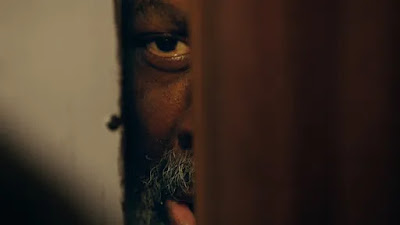Monday, 30 October 2023
Beasts of the Southern wild: "Leo"
Saturday, 28 October 2023
For what it's worth...
My top five:
1. Talk to Me
Roots: "Killers of the Flower Moon"
Monday, 23 October 2023
Remote control: "Taylor Swift: The Eras Tour"
Sunday, 22 October 2023
On demand: "The Burial"
Friday, 20 October 2023
For what it's worth...
My top five:
1. Talk to Me
Spy vs. spy: "The Pigeon Tunnel"
Thursday, 19 October 2023
In memoriam: Piper Laurie (Telegraph 18/10/23)
Born Rosetta Jacobs, she had been rechristened Piper Laurie by Universal execs; publicity material suggested this teenage discovery snacked on petals to maintain her rosy glow. Initially deployed to glam up such filler as talking mule comedy Francis Goes to the Races (1951), Laurie rebelled upon reading her desultory part in one Audie Murphy Western. She tore up the script in her agent’s office, telling him: “They can throw me in jail, sue me, I don’t care what... I’m never working again until I can do something that I have some respect for.”
Extricated from contractual obligation, she demonstrated a new maturity in The Hustler, earning her first Oscar nod as Sarah Packard, the doomed alcoholic who catches pool shark Paul Newman’s eye – but warns him “I’ve got troubles and I think maybe you’ve got troubles. Maybe it’d be better if we just leave each other alone.” Laurie stayed home on Oscar night, wrestling with a longstanding amphetamine dependency; the award went to Sophia Loren for Two Women (1960).
For a decade, she dropped out, moving to Woodstock with her family, kicking the drugs and supporting the civil rights movement (“Being an actor just seemed rather insignificant then”). A New York Times profile of 1972 caught her contentedly baking dill bread. But she would make an arresting comeback – landing her second Oscar nomination – as Margaret White, the heroine’s oppressively devout mother, in Brian De Palma’s adaptation of Stephen King’s Carrie.
There was some confusion as to what role and project entailed: “I read the script and I thought it was just not very good. My husband said that Brian De Palma has a comedic approach to what he does. I thought, oh, I misread the whole thing... it’s satiric. It’s going to be a comedy.” The enduringly chilling results proved otherwise.
Finding comparably dynamic parts few and far between, Laurie travelled to Australia to make Tim (1979), romancing younger co-star Mel Gibson on and off-camera. She also made strides into TV, playing Rachel Ward’s confidante Anne Mueller in The Thorn Birds (1983). The latter provided her with one of nine Emmy nominations: she won once, a Best Supporting Actress gong for the family drama Promise (1986).
She gained her third Oscar nod as Marlee Matlin’s mother in the premium-grade tearjerker Children of a Lesser God (1986). But arguably her choicest role followed when David Lynch cast her as the devious sawmill owner Catherine Martell in Twin Peaks.
The cult drama’s first season saw Martell cheating on her pushover husband and apparently suffering a fiery demise; in season two, Catherine returned in disguise as the mysterious Japanese businessman Mr. Tojamura. Lynch urged Laurie to make the role her own, and the deception was carefully maintained on set: Laurie’s co-stars were informed the newcomer with the Fu Manchu moustache was a revered Japanese performer who had previously worked with Kurosawa.
Gleefully running rings around scene partners, Laurie earned the Golden Globe for Best Supporting Actress in a Series, and a renewed sense of the possibilities that come from true creative freedom. Twin Peaks, she recalled, “was a period when I truly found myself in the craft I have always loved”.
Piper Laurie was born on January 22, 1932, one of two daughters to Detroit furniture dealer Alfred Jacobs and his wife Charlotte (née Alperin). A shy child, she was enrolled for elocution lessons and plied with amphetamines in a bid to control her weight. Aged five, she was sent to a sanatorium alongside her asthmatic older sister Sherrye, an experience that “gave me the great gift of imagination”; upon leaving, she realised she wanted to “create, be brave, do something wonderful in the world”.
She
was signed to Universal in 1949 after screen-testing opposite Rock Hudson, and
made her debut in the family comedy Louisa (1950), playing Ronald
Reagan’s daughter. In her characteristically frank 2011 memoir Learning to
Live Out Loud, Laurie described losing her virginity to Reagan (“completely without grace… no gentleman between the sheets”).
In later life, Laurie worked regularly, guest-starring on E.R. (1995-96) and Frasier (1999), and reuniting with Spacek for the big-screen adaptation of The Grass Harp (1995). She made her directorial debut in her seventies with the short Property (2006); she made her musical theatre debut at 81 in a 2013 production of A Little Night Music; her final performances were for the podcasts Carcerem (2020) and Around the Sun (2022-23).
Revisiting her contract starlet roots, Laurie reflected: “Nobody thought of me as an actress. They just remembered that publicity story about my munching flower petals for breakfast. I even thought of giving up the name Piper Laurie because I felt there was a stigma attached to it. I never could figure out just how many parts I lost and how many parts I won because of this name. I know some producers and directors said, ‘Well, maybe she can act even if her name is Piper Laurie!’”
She married the film critic Joe Morgenstern, whom she met while promoting The Hustler, in 1962; they divorced in 1982. She is survived by their daughter Anne Grace.
Piper Laurie, born January 22 1932, died October 14 2023.
On demand: "The Killing of Kenneth Chamberlain"
Tuesday, 17 October 2023
One foot in the grave: "The Great Escaper"
On demand: "Name Me Lawand"
Sunday, 15 October 2023
On demand: "Alice"
Friday, 13 October 2023
For what it's worth...
My top five:
1. One Fine Morning












